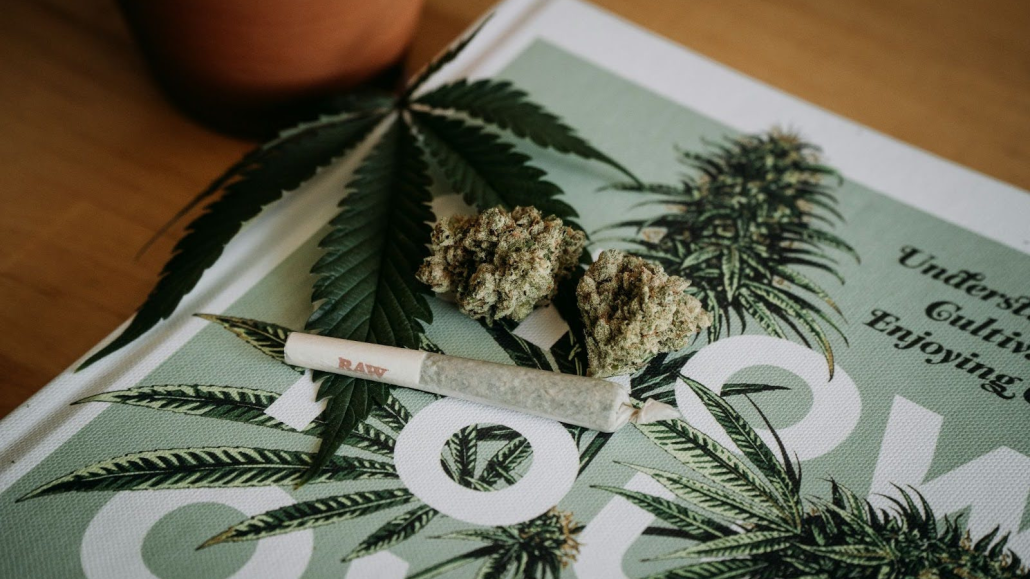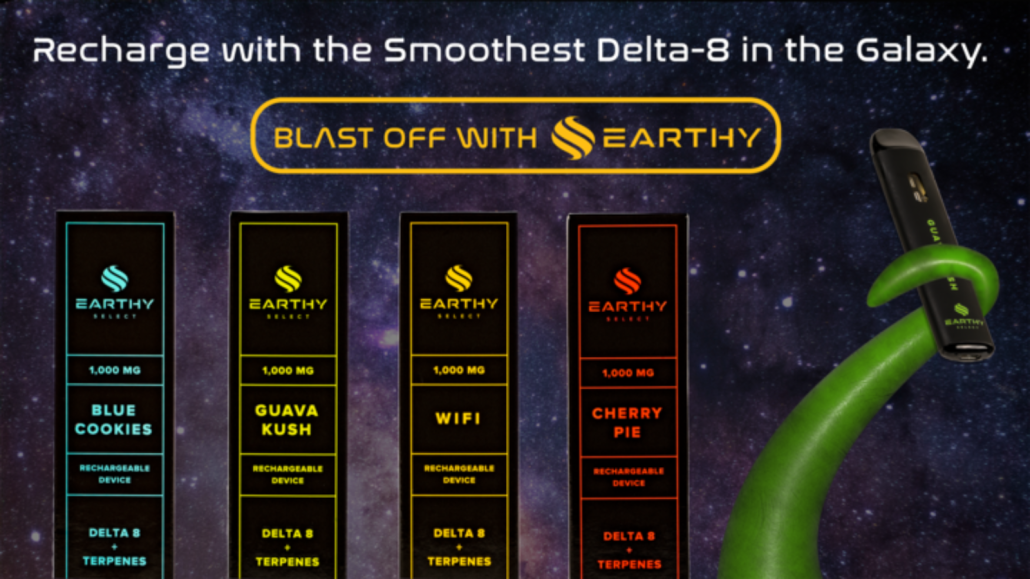CBD vs. Delta-8 THC: What’s the Real Difference?
Key Takeaways:
- CBD Calms Without the High:CBD offers therapeutic benefits without intoxicating effects, interacting with the endocannabinoid system to potentially alleviate conditions like anxiety and chronic pain.¹
- Delta-8 Offers Gentle Relaxation:Delta-8 THC provides a milder psychoactive experience than Delta-9 THC, appealing to those seeking relaxation without intense effects while posing unique legal and safety considerations.²
- Laws Differ Choose Wisely: Legal complexities and varying state regulations impact the availability and safety of CBD and Delta-8 products, underscoring the need for careful selection based on quality and transparency.
In the ever-evolving world of cannabis products, where curiosity often ushers in discovery, two compounds have been gaining notable traction – CBD and Delta-8 THC. As discerning cannabis connoisseurs seek clarity in their quest for optimal experiences, understanding the nuanced differences between these cannabinoids becomes crucial. Our exploration into CBD and Delta-8 THC attempts to illuminate not just the facts but also the deep-seated artistry and cutting-edge science that bring these substances to life.
At Earthy Select, nestled in the vibrant landscapes of Asheville, NC, we are committed to quality, transparency, and customer education. Our mission is to bridge the gap between complex cannabis science and accessible consumer knowledge, ensuring that enthusiasts across the nation can embark on their cannabis journeys with confidence and refinement.
In this article, we’ll examine the intricacies of CBD vs. Delta-8 THC, shedding light on their distinct characteristics, shared roots, and potential effects. Whether you’re a seasoned aficionado or a curious newcomer, this guide enhances your understanding and appreciation for these groundbreaking compounds.
What Is CBD?
Cannabidiol, commonly referred to as CBD, is one of the many cannabinoids found naturally in cannabis plants. Unlike its psychoactive counterpart THC, CBD is non-intoxicating, which means it doesn’t produce the “high” typically associated with cannabis. Its appeal lies in its wide range of applications and potential therapeutic benefits.
CBD interacts with the body through the endocannabinoid system, a complex cell-signaling system that plays a crucial role in maintaining balance or homeostasis. It affects receptors throughout the body, particularly the CB1 and CB2 receptors in the central nervous and immune systems. This interaction can influence how the body perceives pain, mood, and even inflammatory processes.
Scientists have been intrigued by CBD’s potential for managing various conditions, such as anxiety, chronic pain, and even epilepsy. The World Health Organization has acknowledged its relatively safe profile, and the FDA has approved a CBD-based medication for epilepsy, underscoring its medical potential. Nonetheless, while CBD products are available in various forms, such as oils, tinctures, and topicals, consumers should always seek products that offer transparency about their contents and hold to high safety standards.
Understanding CBD involves recognizing that not all products are created equal. The market is saturated with offerings, but quality varies widely. Rigorous testing processes, third-party verifications, and adherence to safety protocols are vital in identifying safe, effective CBD products that can deliver on their therapeutic promises.
What Is Delta-8 THC?
Delta-8 THC, or delta-8-tetrahydrocannabinol, is a naturally occurring compound found in cannabis plants. It is one of the many cannabinoids that have generated intrigue within the scientific and cannabis communities. In comparison, it shares a close chemical structure with the more widely known Delta-9 THC; the differences in their molecular make-up lead to distinct interactions within the body’s endocannabinoid system.
Delta-8 THC is often described as providing a milder psychoactive experience, one that is less intense than the high associated with Delta-9 THC.² This makes Delta-8 an appealing option for consumers seeking the therapeutic benefits of THC without the overwhelming psychoactive effects that some may find uncomfortable. Users often report effects such as relaxation, euphoria, and pain relief, paired with a clearer-headed experience.²
From a scientific perspective, Delta-8’s unique properties stem from its interaction with the receptors found in the nervous system. It binds to the CB1 receptors similarly to Delta-9 THC but with a possibly reduced affinity, leading researchers to explore its potential for delivering health benefits with fewer side effects. The compound has thus sparked a surge of interest, driving innovation in cannabis cultivation and extraction techniques to make it more available to consumers.
Despite its rising popularity, Delta-8 THC remains subject to ongoing regulatory scrutiny and legal debate. Awareness of these intricacies is essential for those looking to explore what Delta-8 has to offer, ensuring that consumers can make informed decisions based on safety and legality. Continued research and transparent practices are integral to developing a deep understanding of Delta-8’s full potential, providing opportunities for responsible enjoyment and discovery in the evolving landscape of cannabinoids.
Potential Benefits Of CBD
Cannabidiol, or CBD, has rapidly become a buzzword in the wellness industry, gaining acclaim for its non-psychoactive properties and wide range of potential health benefits. Unlike its more well-known counterpart, THC, CBD doesn’t induce the intoxicating high that recreational cannabis users typically seek. Instead, it offers a more tempered experience, leading it to be embraced by a diverse demographic, from soccer moms to seasoned professionals looking for natural ways to enhance well-being.
One of the most widely discussed benefits of CBD is its potential for easing pain. Reports from the The National Cancer Institute suggest that CBD may interact with brain and immune system receptors to reduce inflammation and help ease discomfort.³ This makes CBD a promising option for individuals suffering from chronic arthritis or chronic pain, offering potential easing effects without the side effects typically associated with traditional medications.⁴
Potential Benefits Of Delta-8 THC
Delta-8 THC, a compound gaining traction in the cannabis world, offers a unique blend of properties that distinguish it from its more well-known cousin, Delta-9 THC. While both compounds share a similar structure, the nuanced differences result in distinct effects that appeal to a wide range of cannabis users.
Milder Psychoactive Effects
One of the most compelling aspects of Delta-8 THC is its reputation for inducing a milder psychoactive experience compared to Delta-9 THC. Users report a smoother, more subdued high that allows for a functional state of relaxation without the intensity or paranoia sometimes associated with traditional THC. This makes Delta-8 attractive for those seeking a pleasurable experience without overwhelming sensations.
Potential Therapeutic Properties
Emerging research is beginning to uncover the possible therapeutic effects of Delta-8 THC. Research suggests it may have anti-nausea properties, making it a potential ally for those dealing with nausea and vomiting, especially those undergoing treatments like chemotherapy.² Additionally, research suggests that Delta-8 THC might offer a calming effect that may help reduce anxiety without significant psychoactivity – ideal for those seeking relaxation without mental cloudiness.⁵
Appetite Stimulation
Delta-8 THC has shown potential as an appetite stimulant.² Its ability to enhance appetite, known colloquially as “the munchies,” albeit less intensely than Delta-9 THC, is an advantage for individuals looking to increase their caloric intake without feeling excessively immobile or lethargic.
In summary, Delta-8 THC’s unique profile provides an accessible entry point for both seasoned cannabis users and novices alike, thanks to its balanced effects and potential health benefits. However, like any cannabinoid, responsible use and understanding of individual tolerance levels are essential for a positive experience.
Side Effects And Risks of CBD
CBD, or cannabidiol, is celebrated for its therapeutic potential without the psychoactive effects typically associated with THC products. However, even the most acclaimed compounds carry potential risks and side effects that consumers should be aware of, emphasizing the importance of quality and safety in product selection.
Common Side Effects
The side effects of CBD are generally considered mild, but they can occur. These include:
- Dry Mouth: Users may experience a sensation of cottonmouth, likely due to the involvement of the endocannabinoid system in reducing saliva production.
- Drowsiness: Though not sedative for all, some individuals report increased sleepiness or fatigue after consuming CBD, especially at higher doses.
- Appetite Changes: While some users may experience increased appetite, others might notice a decrease, which varies based on individual reactions.
- Diarrhea: Gastrointestinal issues can arise, particularly when starting a new CBD regimen or increasing dosage.
Potential Drug Interactions
It’s crucial to consider CBD’s interactions with other medications. CBD can affect how the body metabolizes drugs, particularly those that involve liver enzymes such as cytochrome P450. This could lead to unintended effects by enhancing or diminishing the medication’s efficacy.
Safety And Quality Concerns
The explosion of CBD products on the market raises considerable issues regarding safety and consistency. Contaminants such as pesticides, heavy metals, or differing levels of THC can infiltrate poorly vetted products. Therefore, consumers need to prioritize CBD products that are rigorously tested to ensure that they meet safety and potency standards. This level of scrutiny is a fundamental step in assuring the product is both practical and safe for personal consumption.
Long-Term Use And Research Gaps
The scientific community acknowledges that there’s still much to learn about CBD, particularly concerning its long-term effects. Current research, while promising, has often focused on short-term use in controlled settings. Larger-scale, long-term studies are necessary to fully understand the chronic effects of CBD consumption and its implications on health and wellness over time.
Understanding these aspects of CBD helps consumers make informed decisions aligned with their health goals and preferences. Acknowledging potential risks underscores the necessity for selecting products that follow stringent safety guidelines and carry recognized certifications.
Side Effects And Risks Of Delta-8 THC
When approaching the use of Delta-8 THC, it’s crucial to be informed about the potential side effects and risks that accompany this compound. Delta-8 THC is an intriguing cannabinoid primarily known for its milder psychoactive effects compared to its Delta-9 counterpart. However, it still presents some risks and side effects that should be considered.
Psychoactive Effects
Delta-8 THC’s psychoactive properties, while generally less intense, can still lead to experiences of euphoria and altered perception. For some users, this might result in difficulty concentrating or impairing motor functions, thus requiring caution, especially when operating machinery or driving.²⁻⁵
Variability In Tolerance
The psychoactive impact can vary significantly based on individual tolerance levels. Novice users might find even small doses unexpectedly potent, whereas regular consumers may require larger amounts for noticeable effects. This variability underlines the importance of starting with lower doses to gauge individual reactions.²⁻⁵
Potential For Anxiety And Paranoia
Though Delta-8 is often touted for its capacity to reduce anxiety, some users may experience the opposite effect. A few individuals report feelings of anxiety or paranoia, especially if they consume higher doses. Tailoring consumption to personal comfort levels and staying aware of one’s mental state while using Delta-8 can mitigate these side effects to some extent.²⁻⁵
Physical Effects
Users might also encounter an increase in heart rate, dry mouth, or red eyes, akin to side effects associated with other THC products. While these are typically mild, they can be uncomfortable, emphasizing the necessity for moderation.²⁻⁵
Quality And Safety Concerns
With Delta-8 THC products, quality and purity are paramount, as the market is relatively new and not yet fully regulated. Products not subjected to rigorous testing may contain contaminants or misleading potencies, leading to unexpected or intensified side effects.
As with any psychoactive compound, responsible usage – coupled with thorough research and an understanding of one’s physiological responses – can lead to a safer and more satisfying experience with Delta-8 THC.
Legal Status Of CBD And Delta-8 THC In The United States
The legality of CBD and Delta-8 THC is a complex and evolving landscape shaped by federal and state regulations. At the federal level, the 2018 Farm Bill marked a significant shift by legalizing hemp-derived CBD containing less than 0.3% Delta-9 THC. This legislation distinguished hemp from cannabis, allowing for the open sale and research of hemp-based products. As a result, CBD products flooded the market, offering consumers a variety of options for wellness and relaxation without the psychoactive effects associated with higher THC levels.
However, Delta-8 THC occupies a more nuanced legal territory. Derived from hemp, much like CBD, Delta-8 THC has surged in popularity due to its slight psychoactive properties and similarity to Delta-9 THC. The federal legality of Delta-8 THC remains ambiguous because it’s often synthesized from CBD through a chemical process, which could classify it under the Controlled Substances Act if interpreted strictly. This grey area has prompted various states to enact their regulations: some have explicitly banned Delta-8 THC, while others permit its sale within specific guidelines.
Final Thoughts
Navigating the differences between CBD and Delta-8 THC is essential for any cannabis connoisseur keen on quality and safety. Both compounds have carved their niches in the world of cannabis, offering distinct effects and benefits. CBD, admired for its non-psychoactive properties, continues to win over those seeking health and healthy solutions without intoxication. Its role in potentially helping to ease anxiety, inflammation, and even sleep disorders showcases its therapeutic prowess.
Earthy Select strides confidently as a trusted source, reflecting a passion for connoisseurship and responsible cultivation. With a dedication to transparency and rigorous quality checks, Earthy Select stands at the forefront of cannabis innovation.
Read also:
Frequently Asked Questions About CBD vs. Delta-8 THC
What is CBD?
CBD, or cannabidiol, is a prominent cannabinoid found in the cannabis plant. Unlike THC, CBD is known for its non-psychoactive properties, making it a popular choice for those seeking potential therapeutic benefits without the high. Earthy Select ensures that every CBD product is meticulously tested at DEA-registered labs to uphold our commitment to quality and transparency.
What is Delta-8 THC?
Delta-8 THC is a cannabinoid similar to its more famous cousin, Delta-9 THC. It offers a mildly euphoric experience, often described as a more subtle, clear-headed high. At Earthy Select, we produce federally-compliant Delta-8 THC products that maintain the highest standards of safety and potency, ideal for those looking to explore unique cannabis experiences.
Is CBD psychoactive?
No, CBD is not considered psychoactive. It does not produce the “high” commonly associated with THC. Instead, many users turn to CBD for its potential to promote relaxation and well-being, aligning seamlessly with Earthy Select’s focus on providing smooth, reliable experiences through superior cannabis science.
Does Delta-8 THC get you high?
Yes, Delta-8 THC can produce a high, though typically less intense than Delta-9 THC. Its effects are often gentler and more calming, making it a popular choice for those who prefer a modulated experience. Earthy Select guarantees the purity and potency of our Delta-8 products through rigorous third-party testing.
Are CBD and Delta-8 THC legal?
Yes, CBD and Delta-8 THC products are legal under federal law, provided they meet specific criteria. Earthy Select strictly follows these regulations, ensuring our products are federal-compliant and can be shipped nationwide. This dedication to legality and transparency sets us apart in the cannabis industry.
How is CBD extracted?
CBD is typically extracted from the cannabis plant using methods like CO2 extraction or ethanol extraction. These processes ensure the final product retains the plant’s beneficial compounds while eliminating unwanted elements. At Earthy Select, we leverage cutting-edge extraction techniques to produce CBD that stands up to our stringent quality control standards.
Medical Disclaimer / Legal Disclaimer – Information is provided for educational purposes only. It does not, and is not intended to, constitute legal advice or medical advice. We strive to be accurate and up-to-date, but the legality of cannabinoids and the science of cannabis are continually evolving. The author is neither a legal professional nor a medical expert. Before buying or using any products, you should consult with your local authorities and medical providers.
Sources:
- Logan, Chelsea. “What Is Cannabidiol (CBD)? Uses, Benefits, and More.” Healthline, 15 Aug. 2023, https://www.healthline.com/health/your-cbd-guide
- “Delta-8 THC: What You Need to Know.” WebMD, WebMD LLC, https://www.webmd.com/mental-health/addiction/what-is-delta-8.
- National Cancer Institute. “Cannabis and Cannabinoids (PDQ®)–Health Professional Version.” National Institutes of Health, 6 Jan. 2023, www.cancer.gov/about-cancer/treatment/cam/hp/cannabis-pdq. Accessed 13 May 2025.
- Grinspoon, Peter. “Cannabidiol (CBD) — What We Know and What We Don’t.” Harvard Health Blog, 24 Aug. 2018, https://www.health.harvard.edu/blog/cannabidiol-cbd-what-we-know-and-what-we-dont-2018082414476.
- Cleveland Clinic. “What Is Delta-8 THC?” Cleveland Clinic Health Essentials, https://health.clevelandclinic.org/what-is-delta-8.






